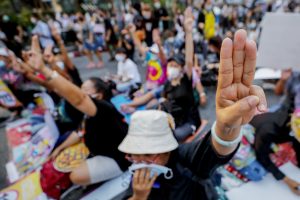The usually tumultuous world of Thai politics has been relatively quiet of late. The youth-led protests that captured the world’s attention throughout 2020-2021 all but disappeared in 2022. The energy and enthusiasm for politics on Thai social media, which played such a crucial role in driving the protests, now feels depleted. The valiant effort young Thais sustained for two years against an unwavering regime has left many of them feeling burnt out.
They aren’t the only ones – even Thailand’s politicians are apparently weary of politics. Parliament has failed to reach its quorum so many times recently that the prime minister was compelled to remind members of their responsibility to attend sessions. Now that a general election is scheduled for May, the actual work of politics – for example, debating and voting on bills – has been dropped, as the politicians busy themselves with preparing their campaigns.
With street politics halted and parliamentary politics effectively on hold until the election, Thailand feels in limbo. There is a sense that the country is taking a collective break: stopping to catch its breath after a difficult few years of protests and pandemic, and bracing itself for whatever might come when the polls open later this year. For observers of Thai politics, who at times may struggle to keep up with the constant intrigue and drama, the lull offers time and space to reflect on all that has happened and make some forecasts about what may lie ahead.
The Rise of the Youth Movement
When the protests began in 2020, they seemed to be all about political representation. The five long years of military rule that followed the coup in 2014 had built up significant anticipation around the 2019 election, especially for younger Thais who were first-time voters. Adding to the excitement was the arrival of a new party, Future Forward, whose youthful image and progressive platform mirrored the identity and aspirations of the younger Thais who supported it.
When the flawed election returned coup-maker General Prayut Chan-o-cha to power, however, those young Thais were angry and dejected. They persevered with Thailand’s procedural democracy until the following year, when Future Forward was dissolved by a dubious, politically-motivated ruling from the Constitutional Court.
Protests against the dissolution of Future Forward were held on university campuses around Bangkok in February 2020, attracting thousands. Long dismissed as politically apathetic, young Thais had suddenly found their voice – and were loudly condemning the perceived interference in the democratic process by the military and the courts.

































